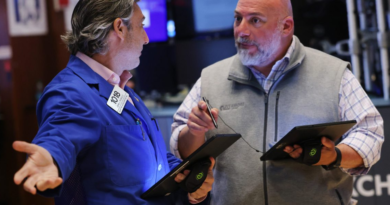Carmakers are struggling to make electric vehicles affordable for pinched consumers—and rethinking their investments amid sagging demand
After years of pumping cash into the sizzling electric-vehicle market, Tesla Inc. and other major automakers are facing a new dilemma: what to do when demand chills.
While the battery-powered vehicle market is still expanding, the pace of growth has slowed considerably. As a result, Tesla, the world’s EV leader, and legacy automakers that had been spending at breakneck speeds to build their electric car businesses, are now taking a more cautious approach to investments.
Companies have collectively committed about $100 billion across North America to create electric cars that don’t just appeal to luxury buyers and early adopters, but to the mass market. But high inflation and interest rates are making vehicle purchases difficult for everyday people, meaning it’s hard for EV makers to win their business. Auto executives have said they’re worried many consumers have hit their limit.
“A large number of people are living paycheck to paycheck, and with a lot of debt, they have got credit card debt, mortgage debt,” Tesla Chief Executive Officer Elon Musk said on an Oct. 18 third-quarter results call. “We have to make our cars more affordable.”
Consider what consumers are seeing on the dealer lot. A Ford F-150 Lightning starts at about $50,000, before federal tax credits of $7,500. A base model gasoline-powered version starts at less than $37,000. General Motors Co.’s Chevrolet Blazer starts at around $37,000, but the electric version costs a minimum $56,000 before tax credits.
The batteries that power EVs are more expensive than internal combustion engines, and it will be at least another three years before these prices are comparable, according the Bloomberg BNEF research.
This makes it hard for even Tesla, the only US carmaker with a profitable EV business, to make its vehicles cheaper. It cut prices drastically this year, in some cases as much as 30%, to protect its sales volumes, pushing others to try to keep pace. In September, the average price paid for an electric vehicle in the US was $50,683, down from $52,212 in August and much lower than the $65,000 companies charged a year ago, according to data compiled by researcher Cox Automotive.
Those discounts eat into companies’ bottoms lines. Tesla’s automotive revenue growth was 51% last year but just 5% in the third quarter of this year. Automotive gross margin tumbled to to 16.3% in the quarter, the lowest in more than four years.
Expansions on Hold
Musk said he may put off plans for a new $1 billion plant in Mexico — a stark turnaround from its March investor day when he bragged about last year’s 50% growth rate.
GM has delayed plans to expand its electric pickup truck production at a plant in suburban Detroit. That factory, located in Orion Township, was supposed to start making the electric version of the Chevrolet Silverado and GMC Sierra pickups next year. Now it won’t start until late 2025. GM will make the two trucks alongside its electric Hummer at a plant in Detroit, but the company said it won’t expand production until it gets a better read on EV demand and makes changes to the truck that will lower manufacturing costs.
Ford Motor Co. has already said it will delay $12 billion of its planned $15 billion in EV-related investments. Chief Financial Officer John Lawler said on Oct. 27 the company is pushing back a second battery plant in Kentucky with South Korean partner SK ON Co. Ford also is reducing production of the electric Mustang Mach-E at a plant in Mexico that was expanded earlier this year.
Ford’s struggles in its nascent electric vehicle unit, known as Model e, resulted in an operating loss of $1.3 billion in the last quarter and more than $4 billion this year. The automaker projects it will lose $4.5 billion on EVs this year.
“While Ford and GM’s move to adjust production plans to lower demand and save capital are pragmatically positive for margins and free cash flow in the short-term, they also raise deeper concerns around their ability to make a successful transition to EV longer term,” Deutsche Bank wrote in a report on Oct. 31.
The slower pace of EV deliveries is also impacting a number of other global automakers, including Mercedes-Benz Group AG and Sweden’s Volvo Car AB, and rippling through the auto parts supply chain. Lithium-ion battery maker LG Energy Solution Ltd. Chief Financial Officer Chang Sil Lee on an Oct. 24 conference call lamented lower sales expectations next year.
Growing Pains
To be sure, there’s not yet evidence for an actual market meltdown. EV sales are still growing, though volume expanded just 6% sequentially in the third quarter after a 14% jump in the prior three-month period, according to researcher Kelley Blue Book. Sales in the US are up almost 50% in the first nine months of the year over last year — and in two years battery-powered cars have more than doubled their market share in EV leader California — but the pace of growth is declining.
There normally are aches and pains associated with technological change, according to Stephanie Valdez Streaty, director industry insights at Cox. “Anytime there is new tech, the adoption is hard,” she said.
It’s just not clear when those difficulties end. As more companies debut long-planned EVs into a less-receptive marketplace, inventory is piling up. At the end of September, automakers had 88 days’ worth of EV inventory, compared to 56 days for conventional models, according to data from Cox.
“It’s concerning,” Valdez said. “Last year, they didn’t have to cut prices and there was a waiting list for these vehicles. Now there’s more inventory.”
They might not be able to rely as much on corporate buyers and rental car fleets, either. Hertz Global Holdings Inc. CEO Stephen Scherr said the rental company will slow the pace of EV purchases after lower resale prices left the company eating higher depreciation costs.
Mass Market
GM could reach the mass market next year when the lower-priced version of its Chevrolet Equinox EV goes on sale, and in 2025 with a new Chevy Bolt that will sell for even less. Chevy originally said they would see the Equinox for around $30,000 with around 250 miles of range on a full charge. But with consumers sweating the lack of charging infrastructure, GM upped the range and price to $35,000 for a car that can go 319 miles on a charge.
Even as US automakers weigh how best to catch up to Tesla, Musk says his company has to watch the global economy before greenlighting the Mexico plant. He also said Tesla will keep growing but added that said the company’s 50% growth rates are a thing of the past. Even marketing won’t help, he said.
“Informing people of a car that is great, but if they cannot afford it, it doesn’t really help,” Musk said. “Really the thing that must be solved is to make the car affordable.”
— With assistance by Chester Dawson and Dana Hull




